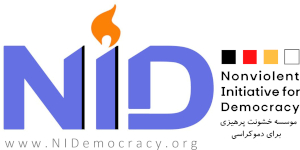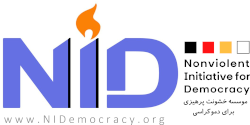Almost a year has passed since the death of Zhina Mahsa Amini in the custody of the Guidance Patrol, the religious morality police of Iran’s government, and the nationwide protests of the Iranian people known as the “Women, Life, Freedom” movement, which were violently suppressed by the Islamic Republic. More than five hundred people were killed, thousands were injured, and the implementation of heavy sentences for protesters, such as execution, shows the use of violence by the Islamic Republic in suppressing the protesting people.
However, are governments allowed to resort to violence and excessive force in response to popular protests?
The use of violence by the armed forces against the unarmed citizens who hold a protest rally without weapons lacks legal legitimacy for various reasons. In all legal systems, the right to protest is recognized, and the use of excessive force to confront protesters is not permitted. They have inflicted punishment for the violators.
The most important reasons that refute the use of violence by the police and armed forces against unarmed protest gatherings are as follows:
1. Acknowledgment of the Principle of the Right to Protest and Freedom of Assembly
The right to protest and hold gatherings is recognized in the Constitution of the Islamic Republic of Iran. According to Article 27 of the Constitution of the Islamic Republic of Iran, holding gatherings without carrying weapons is permissible and does not require obtaining a permit. This article states: “The formation of gatherings and marches, without carrying weapons, as long as they do not disturb the law of Islam, is permitted.”
This principle is explicit and its implementation has not been referred to ordinary laws. Thus, it remains invulnerable to normal legislation as well. However, the representatives of the Islamic Consultative Assembly have attempted to restrict this constitutional principle through the passage of a law titled “Law on the Activities of Parties, Communities, Political and Trade Unions, and Islamic or Religious Minority Associations.”
Nevertheless, it should be noted that neither in the Constitution, nor in the ordinary law approved by the parliament, nor in the regulations on how to ensure the security of legal gatherings and marches, which was approved during the government of Mohammad Khatami, not only is there no authorization granted for the use of violence by the police, military, intelligence, or security agencies against peaceful protest gatherings, but these laws also explicitly state that the police is responsible for ensuring the security of events, and other military institutions do not have the right to intervene.
Therefore, as long as protesters gather without weapons in the streets or public places, their assembly is legal, and the police do not have the right to use violence or suppress the protesters. The police force is only responsible for ensuring the security of the protesters and maintaining order.
2. The Violation of International Treaties
• International Covenant on Civil and Political Rights
According to the provisions of the International Covenant on Civil and Political Rights, which the Islamic Republic of Iran also accepted, the right to assemble, the right to freedom of expression, and the right to protest are recognized, and governments cannot place any restrictions in their domestic laws that hinder the realization of these rights.
In paragraph 2 of Article 22 of this international covenant, it is stated:
“No restrictions may be placed on the exercise of this right (freedom of association with others) other than those which are prescribed by law and which are necessary in a democratic society in the interests of national security or public safety, public order (ordre public), the protection of public health or morals, or the protection of the rights and freedoms of others. This article shall not prevent the imposition of lawful restrictions on members of the armed forces and of the police in their exercise of this right.”
In addition, in Article 19 of the same international covenant, it is also stated that no one shall be prosecuted and tried on account of their beliefs. Everyone shall have the right to freedom of expression; this right shall include freedom to seek, receive, and impart information and ideas of all kinds, regardless of frontiers, either orally, in writing or in print, in the form of art, or through any other media of his choice.
• Universal Declaration of Human Rights
The right to protest, the right to freedom of expression, and the right to assemble are all recognized in the Universal Declaration of Human Rights, and governments cannot deprive individuals of these rights through the use of excessive force.
Dr. Payam Akhavan, an international law professor at McGill University in Canada and a consultant to the Prosecutor’s Office of the International Criminal Court in the Yugoslav case, had previously stated in an interview: “According to the Universal Declaration of Human Rights, governments not only do not have the right to use weapons to suppress opponents, but even when the police are chasing an armed murderer, they must first order him to put down his weapon, let alone citizens who peacefully march without weapons. These cases are definitely violations of human rights, and the offending governments, including the Iranian government, deserve criminal punishment.”
3. The Principle of Necessity and Proportionality in the Use of Excessive Force
The use of excessive force by authorities is only permissible when peaceful means fail to eliminate the threat, and is required by necessity. This means that the use of force by the police is the last resort, and even at this stage of emergency, the principle of proportionality between the force used and the threat or danger is crucial. That is, governments should not, for example, shoot at protesters because a trash can was set on fire at a demonstration.
Article 4 of the law regarding the use of weapons by the personnel of the armed forces permits the use of firearms in necessary cases to restore order and control illegal marches, suppress riots, and quell unrest. However, within this law, two important points are explicitly mentioned: First, it specifies that the use of firearms is allowed in response to illegal demonstrations, riots, and unrest. Second, it applies when the police are unable to maintain security without resorting to weapons.
As mentioned above, according to the Constitution of the Islamic Republic and in accordance with the International Covenant on Civil and Political Rights and the Universal Declaration of Human Rights, holding peaceful protests without weapons is legal, and it is the duty of the police to ensure the security of the protesters rather than attempting to disperse them through the use of excessive force.
Even if the police consider such protests to be illegal, they do not have the right to use firearms to disperse the protesters or directly shoot at them because shooting directly at the protesters lacks proportionality with an unarmed protest gathering. Even if protesters throw stones, the police cannot respond directly with bullets.
The police should deal with protest gatherings peacefully, with restraint and appeasement, continence and patience. The police should never use force based on the content of slogans, because freedom of speech is recognized in the constitution and international law and is the same as the law. If the police are concerned about violent behavior by protesters, damage to public property, etc., they should use means that is proportional to the type of violence of the protester and its potential dangers. On the other hand, the police should open the escape route for the protesters when resorting to excessive force; that is, the goal should be to avoid danger, not to trap the protesters. This means that when the protestors are running away, shooting them and blocking their escape routes is a criminal and prosecutable act.
Therefore, the use of firearms and direct shooting at peaceful civilian protesters is contrary to the principles of necessity and proportionality in the use of excessive force. This is why António Guterres, the Secretary-General of the United Nations, has issued warnings to Iran regarding the violation of these principles.
4. The non-necessity of obeying the police outside their legal duty
Citizens are only required to obey the police when they are carrying out their legal duties. Dispersing unarmed protest gatherings is not only not the legal duty of the police but it is also against the law. The police’s use of armed force against unarmed protesters is outside their lawful duties, and confronting it is considered a legitimate act.
Article 607 of the Islamic Penal Code (Penalties Section), enacted in 1996, states: “Any attack or resistance carried out knowingly and willfully against government officials in the course of their duties is considered rebellion.” In other words, resistance against the police is considered rebellion when the police are performing their legal duties. Thus, If the police step outside their legal authority, resistance against them is not considered rebellion and a criminal act, but is instead regarded as legitimate self-defense. In such cases, the police have no right to resort to arms and violent behavior in the face of legitimate resistance.
Article 4 of the Amended General Penal Law of 1973 also states: “Resistance to security and law enforcement forces when they are engaged in the performance of their duties is not considered a defense. But if the said forces step outside the boundaries of their duties, and based on evidence and indications, there is a fear that their actions may lead to murder, injury, or violation of honor or property, in such cases, self-defense is permissible.”
In response to the question of when the police can use violence, Mr. Hossein Reisi, a lawyer, says: “The police have the right to use force only in two situations:
1. When the crime is obvious;
2. When there is a judge order.
The police do not have the right to use violent force against peaceful protest gatherings because, firstly, peaceful protests are not illegal or criminal. Secondly, the judge’s order has meaning after the act has been committed, not before a criminal act has occurred. Therefore, the violent use of excessive force by the police against protesters is a misconduct and can be prosecuted.”
Accordingly, the police and other armed forces should be reminded that the use of violence, the deployment of weapons, and direct shooting at protesting citizens are criminal acts as long as protestors have not carried out an armed protest. The duty of the government and the police is to maintain the security and respect the rights of citizens and respond to their needs and demands, not to resort to violence and the use of excessive force.


